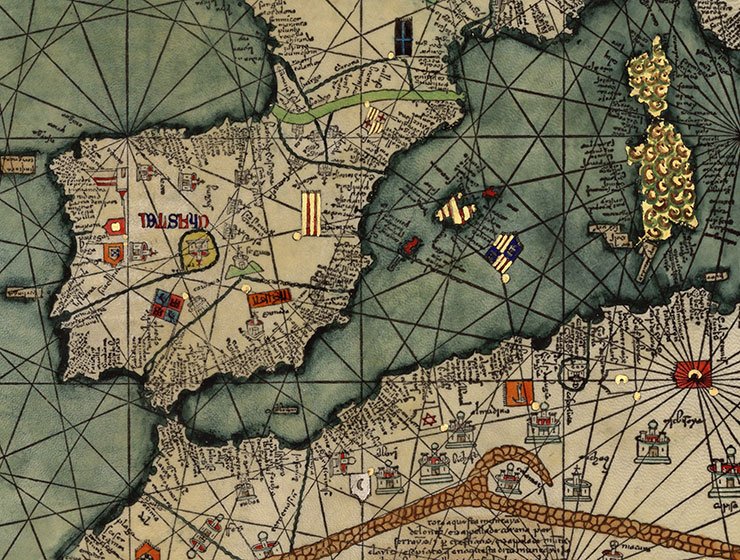
-Index-
Preface
Introduction
Antonio CORTIJO, Vicent JOSEP ESCARTÍ, Vicent MARTINES
Original title: Introduction
Special Issue
The Evolution of the Verbal Form cantara in Catalan: A Textual Corpora Analysis
Carles SEGURA-LLOPES
Original title: L’evolució de la forma verbal cantara en català: un estudi de corpus
Keywords: Catalan, Historical Grammar, Semantics, Syntax, Verbal Tense.
The analysis of verbal tenses is a well-studied topic in Romance Languages, for which there are excellent studies and monographs in what pertains to the Catalan language. In this article we offer an overview of this topic based on an analysis of several electronic corpora developed within the Institute ISIC-IVITRA or with its participation, such as: the Electronic Corpus of Old Catalan (Corpus Informatitzat del Català Antic [CICA]), the Metacorpus(that is the Electronic Multilingual Corpus of Old and Contemporary Texts, Corpus Informatitzat Multilingüe de Textos Antics i Contemporanis [CIMTAC]), and the Electronic Corpus for the Old Catalan Grammar (Corpus Informatitzat per a la Gramàtica del Català Antic [CIGCA]). We study the forms of the verb cantara from the first examples of its use in the 12th century to the end of the 16th century. Our intention is to identify their main values, describe the progressive development, and determine how and when these forms assumed the typical syntantic functions associated with the imperfect subjunctive that are typical of Castilian and of many of the Valencian varieties of the Catalan language.
From cognitive perception to auditory perception. The evolution of the verb entendre in Old Catalan (13th-16th centuries)
Jordi Manuel ANTOLÍ MARTÍNEZ
Original title: De la percepció cognitiva a la percepció auditiva. L’evolució del verb entendre en català antic (segles XIII-XVI)
Keywords: Auditory Verbs, Evidenciality, Invited Inferencing, Old Catalan, Perception Verbs, Verb Entendre.
This study analyzes the process of semantic change by which the Old Catalan verb entendre developed from the 13th to the 16th centuries from a meaning based on intellectual perception to one implying auditory perception. In particular, this article shows that by the end of the 14th century the verb entendre had only semanticized the perception of linguistic stimuli and had not fused completely with the meaning of the verb oir, as was the case with the evolution of INTENDERE in other Romance languages (such as French, Occitan, and Sardinian). Our study has been based on data analysis of an electronic linguistic corpus using the concepts of E. C. Traugott's Invited Interfering Theory of Semantic Change (TCSII) (2012) and the concept of evidenciality.
The Arbitral Sentence Regarding Walls and Valleys from 1406. Study and Edition
Agustí CAMPOS PERALES
Original title: La sentència arbitral de murs i valls del 1406. Estudi i edició
Keywords: Edició, Junta de Murs i Valls, Manuscrit, Medieval, Urbanisme.
Public urbanism during the late middle ages in Valencia was regulated by the activity of the Jurats, their executive power, and the Junta de Murs i Valls, an institution created in 1358 to manage the constructions of walls, moats or roads inside the city’s boundaries. This institution (the Junta), however, was not provided with a legal basis until 1406 when an arbitral sentence between the city of Valencia and the military estate was promulgated. From this agreement or sentence, an edition of which is included in this article, we can know the legal and administrative development of this institution as well details on construction activities in medieval Valencia.
The Evolution of the Main Topics in Ausias March According to the Three-Fold Love Process
Tània ARAGÓ MELIÀ
Original title: L’evolució dels principals tòpics ausiasmarquians en relació amb l’evolució de les tres fases amoroses
Keywords: 15th century, Ausiàs March, Disappointmentm poetry, Loving failure, Passion.
This article analyzes the writings of Ausiàs March as derived from the concept of ‘failure’ in love. Ausiàs was not interested in the abstract analysis of the different types of love but in the study of his very own nature, as he felt devastated by his dissapointment with love. His verses reveal a personality full of contradictions showing his changing and volatile mood as he focused on three different concepts of love: spiritual love, human love, passionate love. Through the analysis of these three concepts, we try to answer the following question: through his analysis of the secrets of love, was Ausiàs March able to ever find virtue?
Francesc-Gilabert de Centelles i Queralt, First Count of Oliva, and his presence in the meeting of the Parliament of the Crown of Aragon in the 15th Century
Rubén GALERA HERNÁNDEZ
Original title: Francesc-Gilabert de Centelles i Queralt, primer comte d’Oliva, a les Corts de la Corona d’Aragó durant el segle XV
Keywords: Centelles, Comtat d’Oliva, Corts, Francesc-Gilabert de Centelles i Queralt.
This article deals with the figure of Francesc-Gilabert de Centelles i Queralt (1408-1480), first Earl of Oliva (in the Kingdom of Valencia) and highlights his role in the Crown of Aragon, especially in reference to his presence in the “Corts” (or Parliamentary Courts).
Alfons de Borja i Roderic de Borja According to Alfons the Magnanimous’s Crònica i diatari del capellà
J. EMILI ROIG
Original title: Alfons de Borja i Roderic de Borja segons la Crònica i dietari del capellà d’Alfons el Magnànim
Keywords: Alexandre VI, Alfons de Borja, Borja, Calixt III, Diary, Roderic de Borja, Valence.
Medieval diaries are a valuable source of knowledge about daily occurrences that their author wanted to record. The Dietari del capellà d’Alfons el Magnànim is a remarkable source for the lives of two characters thyat belonged to the Borja/Borgia family, Alfons de Borja and Roderic de Borja (Popes Callistus III and Alexander VI respectively).
An Approach to the Sources of Jaume Ramon Vila’s Dietari
Arantxa LLÀCER MARTORELL
Original title: Aproximació a les fonts del Dietari de Jaume Ramon Vila (AHCB, ms. b-100)
Keywords: Barcelona, Diary, Jaume Ramon Vila, Source.
This article studies the figure of the historian and heraldist Jaume Ramon Vila through the analysis of one of his unpublished works, a diary that narrates events that belong to the years 1596-1601. The author, a well-known writer within the field of early modern Catalan studies, designed his diary as a commentary on the most important events that took place in the city of Barcelona and the Principality of Catalonia. Vila used all his historiographic knowledge in the production of his diary and the result if a text based on the principle of truthfulness that makes use of his personal notes and documentary sources to support his assertions. The study of the sources and the diary provide us with a better understanding of the period and of an author somewhat underrated by previous scholars.
Critical Edition and Analysis of La vida de sanct Honofre (The Life of Saint Onofre), Published in Valencia at the Beginning of the 16th Century
Vicent JOSEP ESCARTÍ
Original title: Edició filològica i breu comentari de La vida de sanct Honofre, publicada a València a principis del segle XVI
Keywords: 14th-16th c., Catalan Literature, Edition, Life of Saint Onofre, Valencia.
This article provides a study and philological edition of the Vida de sanc Honofre based on the 16th-c. princeps text. Although there exist previous modern editions of this work, none of them offers a critical text nor have been adequately disseminated for a wider audience. The introductory study analyses the date of composition of this work, its literary sources, and its process of composition.
Moro-Moro Criticism and Aesthetics: al-Andalus and the Moors and Christians Philippine Theatre
Isaac DONOSO
Original title: Crítica i Estètica del Moro-moro: Al-àndalus i el teatre filipí. De moros i cristians
Keywords: Al-Andalus, Alcoy, Hispanic Conquest’s Dramas, Komedya, Moro-Moro, Moros y Cristianos, Muslim-Christian Relations, Philippines.
This article analyzes the influence of al-Andalus in Asia and its paramount role in the definition of Islamicity in the Philippines. It studies the theatrical genre called Moros y Cristianos (Moors and Christians) which originated in Valencia ―in particular in Alcoy― and later attained a worldwide dissemination. The article describes the main elements of this genre (and the general festivities within which it takes place) as well as the ideological underpinnings of the battles between Muslims and Christians that take place during these festivities. The main purpose of the study is to identify cultural trends in the formation of the Komedya in the Philippines and the creation of the Moro-Morista tradition.
Nicolau Primitiu and the Interest on the Cultural Legacy of the Kingdom of Valencia
Alaitz ZALBIDEA BERENGUER
Original title: Nicolau Primitiu i l’interés pel llegat cultural del Regne de València
Keywords: 20th c., Nacionalism, National renaissance, Nicolau Primitiu, Valencia.
This article is devoted to the analysis of Nicolau Primitiu-Gómez-Serrano’s works (1878-1971) devoted to reivindicate the dignity of Valencian culture, such as essays, personal memories), and poems. The article offers an overview of his thought based on the analysis of his works devoted to medieval culture. Quotes from his works allow the reader to get a taste of the author’s genuine Valencian, full of medieval nuances both in its morphology and vocabulary.
Articles
Under the eyes of the men of stone: the importance of the method in the medieval education from the writings of John of Salisbury
Carlile LANZIERI JÚNIOR
Original title: Sob os olhos dos homens de pedra: a importância do método na educação medieval a partir dos escritos de João de Salisbury
Keywords: Educational Methods, John of Salisbury, Metalogicon, Middle Ages, Modern Pedagogy.
Among the main characteristics that define modern Pedagogy we could mention the taste for novelties and the disregard for educational practices that belong to previous historical periods. In this article, the authors offer an insightful criticism of such elements and offer an overview of the pedagogical practices developed by medieval teachers, in particular by John of Salisbury.






















































































